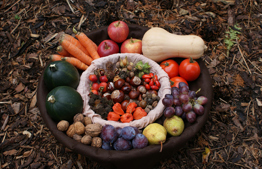Laws of Ma'aser Rishon

Laws of Ma'aser Rishon, giving it today to a Levi, can we give it to a Kohen? To a bat Levi who is married to an Israel? To a widow of a Levi? And much more
Basic Laws
"And to the Levites I hereby give all the tithes in Israel as their share in return for ... the services of the Tent of Meeting" (Bamidbar 18:21).
Rambam writes (Introduction to Hilchot Ma'aser): "There is one commandment to separate the first tithe in each year [crops are] sown, and give it to the Levites."
Ma'aser rishon is taken after separating teruma gedola and is 10% of the produce remaining after separating teruma gedola. In Temple times approximately 2% was designated as teruma gedola, so ma'aser rishon was approximately 9.8% of the total produce. Today we separate a little bit of produce (kolshehu), so ma'aser rishon is a just less than 10% of the total produce.
Ma'aser rishon is taken on years 1-6 of the shemita cycle; during shemita, in principle, terumot and ma'aserot aren't taken.
Ma'aser rishon is not sacred whatsoever and is permissible to eat in a state of ritual impurity (Rambam, Hilchot Ma'aser 1:2). Levi'im may do with it as they please—even donate it to charity or return it to the owner.
This gift is given to Levi'im as compensation for their services in the Ohel Mo'ed. Levi'im don't have a portion in the Land of Israel and it seems they were poor. While Kohanim receive many gifts, Levi'im receive only ma'aser rishon. Rabbi Eliezer Melamed (Kashrut I 7:7) asserts that the disproportionate ratio of Kohanim to Levi'im throughout the generations (initially Kohanim accounted for only 10% of the tribe of Levi) is a result of the latter's poverty.
Levi'im served as the nation's rabbis and teachers ("Of Levi he said … They shall teach your laws to Jacob and Your instructions to Israel," Devarim 33: 8-10) and were officers from King Yehoshafat's time (Yevamot 86b).
Should we give it today to Levi'im?
Today, even when the Levi'im are not serving in the Beit HaMikdash, do we still need to give them ma'aser rishon?
Like many things in Judaism, even if the reason no longer applies, the institution nevertheless remains in place. That is: the law of giving teruma to a Kohen and ma'aser rishon to a Levi still applies today, even though we don't currently have a Beit HaMikdash and the vast majority of us don't have farmland. The poskim unanimously rule that even in the absence of the Beit HaMikdash, we should continue to give teruma and ma'aser rishon to the Kohen and Levi, respectively.
How do we know that a Levi today is indeed a Levi?
The Shulchan Aruch (YD §331:19,52,68) rules that we should give ma'aser rishon to Levi'im even today. He implies that it isn't necessary to seek out a "pedigreed" Levi (Levi meyuchas); if someone claims to be a Levi, we believe them.
Rabbi Avraham Yeshayahu Karlitz, the Chazon Ish, writes an astounding chiddush (Shevi'it 5:12). He asserts that today there no longer are pedigreed Levi'im. There is a concern that if we begin to give ma'aser rishon to Levi'im, devious Yisra'elim might pose as Levi'im. For this reason, ma'aser rishon should not be given to Levi'im—not even to "pedigreed Levi'im." Others claim that today we can't be certain that someone is a Levi, and since ma'aser rishon is a monetary matter, the rule applies: hamotzi mechaveiro alav hara'aya: to take possession of an object in another's possession one must prove it is his. Therefore, they rule that there is no need to give ma'aser rishon to a Levi unless he can prove his Levirate lineage.
In practice, most poskim disagree: just as we rely on Kohanim are Kohanim due to chazaka, and they perform the mitzvot of redeeming firstborns and recite the priestly blessing, we also rely on the chazaka of Levi'im (Rabbi Chaim David HaLevi, "The status of Kohanim and Levi'im today," HaTorah VeHa'aretz IV 5759 pp 266-274). The concern that others will pose as Levi'im is not written by any earlier poskim, and we need not be concerned about this far-fetched possibility.
In the case that the Levi agrees to give all of the proceeds to Torah institutions, meaning that he will not benefit from it, it is possible that even the Chazon Ish would agree to giving such Levi'im ma'aser rishon today. Indeed, the Chazon Ish writes (ibid.) that the reason that we give a Kohen silver coins today to redeem the firstborn is because he returns the money to the father, so he does not profit from it (thus there would be no impetus for non-Kohanim to pose as Kohanim).
Most contemporary poskim indeed rule that we give ma'aser rishon to a Levi even today (rabbis include: Chaim Sithon, Avraham Yitzchak Kook, Yechiel Michel Tucazinsky, Tzvi Pesach Frank, Chanoch Zundel Grossberg, Shaul Yisraeli, Mordechai Eliahu, among others).
At Beit HaOtzar, the service run by Torah VeHa'aretz Institute, we go about giving ma'aser rishon in a mehudar fashion: we give it to a pedigreed Levi who has a written genealogy going back several centuries, who, in turn, donates all the money to Torah institutions.
Is it possible to give ma'aser rishon to a Kohen?
Kohanim are part of the tribe of Levi, so it stands to reason that they also deserve ma'aser rishon. However, Kohanim receive the teruma gedola along with all the other 24 priestly gifts, while the Levi has to give a tenth of his ma'aser to a Kohen. So it seems strange that ma'aser rishon should also go to a Kohen.
While Rabbi Akiva holds that only Leviyim should receive ma'aser rishon, Rabbi Elazar believes it is possible to give to Kohanim as well. The halacha follows Rabbi Akiva.
The Gemara (Yevamot 86b) writes that Ezra fined the Leviyim, since they failed to come to the Land of Israel in the early Second Temple period. He ruled that the entire ma'aser rishon should not be given to Leviyim, and permitted giving it to Kohanim or appropriating it for other needs, as the Beit Din saw fit (the poor, Torah scholars, the Temple treasury, and communal needs). Accordingly, the Tosafot hold that it is also possible to give ma'aser rishon to Kohanim today. Rambam and the Shulchan Aruch, however, write that this fine was annulled following the Second Temple's destruction, and that today ma'aser rishon should be given to Leviyim only.
In practice, one should optimally give ma'aser rishon to a Levi; bedi'avad, if given to a Kohen, one fulfills the obligation.
Does a Levi or Kohen need to give ma'aser rishon to another Levi?
A Levi needs to separate ma'aser rishon, but can keep it for himself. He need not give it to another Levi (see Rambam, Hilchot Ma'aserot 1:3-4). Since there are opinions that ma'aser rishon can be given to a Kohen as well, Kohanim may also keep the ma'aser rishon (after separating it).
Ma'aser rishon for a daughter and wife of a Levi
"And to the Levites I hereby give all tithes … you and your households may eat it anywhere" (Bamidbar 18:21, 31). Commentators understand "your household" to include the wife and children. Thus, ma'aser rishon can be given to an unmarried bat Levi and to a bat Yisrael married to a Levi.
But what happens when a daughter of a Yisrael, previously married to a Levi, is widowed or divorced but has children from her former husband? The former wife of a Kohen may eat terumah as long as she has children from her former husband. Some say the same holds true for a widow/divorcee of a Levi, but others forbid this. In practice, it's optimal to give to a different Levi (see Rabbi Yoel Friedemann's article in Emunat Itecha, issue 114, 5777). Even stringent opinions allow giving ma'aser rishon to bar-mitzvah aged children and little children, even if they are living with their non-Levi mother.
The poskim are divided regarding a daughter of a Levi who marries a Yisrael. According to the plain meaning of the Mishnah (Yevamot 9: 5–6) it seems that this should be not permitted. According to the gemara, however (Yevamot 87), it is not so clear-cut. Those who permit this learn from the halacha (Shulchan Aruch YD 61:8) that permits giving the foreleg, cheek, and maw to the daughter of a Kohen married to a Yisrael. Others view "Give it to a Kohen" as a special case and referring to a kohenet; otherwise women follow their husbands.
In practice, it's possible to give such women if there are no other Levi'im or Kohanim. A Yisrael married to a bat Levi and the bat Levi may rely on the poskim and keep the ma'aser, since "hamotzi mechaveiro alav harayah" (Rabbi Ehud Achituv, Emunat Itecha, issue 62, 5765).
Giving ma'aser rishon when there is a doubt
Rambam (Ma'aser 9:2) rules: "One need not separate ma'aser rishon … since it is uncertain, for this reason we say to the Levi … bring a proof that it is untithed and then take the tithes."
If there is uncertainty whether or not produce is tithed (that is, safek tevel), terumot and ma'aserot are taken so that the produce will no longer be in an uncertain status. However, the ma'aser rishon need not be given to the Levi. While it is forbidden to eat safek tevel, giving the produce to a Levi is a monetary mater. In this realm, the principle "hamotzi mechavero alav hara'aya" is employed. That is: if the Levi wants to take produce from its owner, he must prove that the produce is definitely untithed (tevel vaday). Since this is impossible, the owner need not give the ma'aser rishon to the Levi. Even so, terumot and ma'aserot still need to be set aside in such cases and the formula is recited in its entirety.
Sefek tevel can be a practical doubt (I'm not sure if terumot and ma'aserot were properly separated from this produce) or a halachic doubt (I'm not sure if terumot and ma'aserot need to be taken from the produce):
- Relevant when purchasing fresh produce at the open market and from places without kashrut certification.
- Someone brings me produce and I'm not sure where he bought/received them (and I'm embarrassed to ask or don't trust him).
- Someone tells me that he tithed the produce, but I don't completely trust him.
- Produce grown inside the home or in a hothouse (as there are opinions that they don't require tithing).
- Produce grown in areas of Israel where it is unclear whether tithing is mandated.




